High sampling frequency considerations, Tdif-1 card, Adat card – Teac DM-24 User Manual
Page 121: 16 – options—tdif-1 card

16 – Options—TDIF-1 card
TASCAM DM-24 Reference Manual
121
High sampling frequency considerations
NOTE
When cascading, all units must either be in high sam-
pling frequency mode or all units must be in normal
sampling frequency mode.
Because of the reduced number of aux sends, the cas-
cade screen changes when the high-frequency mode
is selected, as shown here:
TDIF-1 card
The optional TDIF-1 card provides an additional
eight channels of I/O (four in high sampling fre-
quency mode).
As with the built-in TDIF-1 connectors, data can be
accepted using 16, 20 or 24 bit word lengths to match
the connected device. The card takes its values for
these input parameters from the settings made in the
MULTI I/O
section of “The FORMAT screen” on
The output parameters cannot be changed (fixed at
24-bit, with the emphasis status echoing that of the
input).
ADAT card
The optional ADAT card provides an addition eight
channels of digital audio I/O using a “lightpipe”
TOSLINK fiber connection.
Any word sync connection from an ADAT connected
via this card must be made through the on-board
WORD SYNC connector, as the card is not fitted
with a word sync input.
The clock can be set as in the same way as for the
built-in ADAT connection (“CLOCK settings” on
page 24).
All other parameters (word length and sampling fre-
quency) are determined by the ADAT device, and
may not be set on this screen.
NOTE
This card cannot be used in high sampling frequency
mode. A message is displayed in the appropriate part of
the screen if the card is fitted and high sampling fre-
quency mode is selected.
